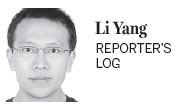I have been working for China Daily for six years and have conducted interviews at the annual two sessions three times. Were it not for the two meetings that gather China's top legislators and political advisers every March, a young reporter such as I would not have an opportunity to meet so many Chinese elites, from President Xi Jinping to basketball player Yao Ming.
Yet, to my disappointment, many reporters like to run after star conference attendees, asking questions about their private lives and businesses that are irrelevant to the conference agenda or the person's role in the meeting. Such reports or programs are popular because of the celebrity effect.
Some reporters are better. They ask some experts or ministers about their proposals to the government or lawmakers, or their viewpoints on some issues with meaning for the public. But such interviews are invariably short, taking place on staircases or in the corridors of the conference halls. After taking a photo and recording a two-minute answer, the journalist fulfills the task and returns like a happy hunter.
Since 2013, I have worked as correspondent at China Daily's local bureaus, and I've visited many parts of China. Interviewing the poorest farmers deep in the mountains, as well as some of China's top billionaires and industry tycoons in big cities, I have gained firsthand knowledge of the country's problems, and I know every minute counts at the two sessions, as there are so many important laws, rules and policies to discuss and to make that are of crucial significance to the bettering of the nation.
China is establishing the rule of law, pursuing innovation, restructuring its economy, bridging the income gap and cleaning its environment. And the operation of the Chinese government heavily depends on policies, rules and plans. The sessions are the best stage for representatives of nearly 1.4 billion people and senior advisers to negotiate and reach consensus on key issues.
An outdated law, if not revised, would be a bad law. An old industrial policy, if not corrected, would thwart the development of emerging industries. A national policy, if not updated to fit the changes in society, would drain social vitality. Behind every "if" are the interests of not only tens of millions people but also the nation as whole.
Most important, this year is the first year of the 13th Five-Year Plan (2016-20). By 2020, the Chinese government has pledged to double residents' income from the 2010 level, a tough mission given the slowdown in Chinese economic growth and inflation pressure.
As a reporter, I hope my peers can focus more on the worthwhile topics and have more in-depth interviews with the key figures making the country's policies and laws.